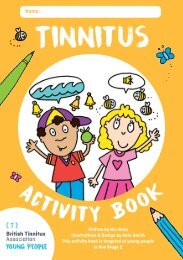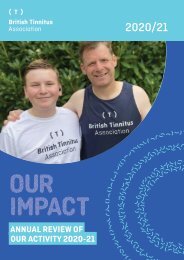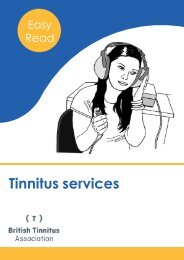Sound enrichment (therapy) Ver 2.1
Create successful ePaper yourself
Turn your PDF publications into a flip-book with our unique Google optimized e-Paper software.
noise, which is a gentle rushing sound similar to a<br />
radio tuned off-station (static).<br />
Wearable sound generators are an optional part of<br />
tinnitus <strong>therapy</strong>, and should always be fitted by a<br />
tinnitus specialist as part of a tinnitus management<br />
programme. They look like small hearing aids, and can<br />
be worn in the ear, or behind the ear. The behind the<br />
ear sound generators are generally preferred, as they<br />
do not block the ear. It is very important that when you<br />
wear them you do not feel that the sound generator<br />
fitting blocks your hearing.<br />
Hearing aids<br />
If you have hearing loss - even a very mild one - and<br />
you strain to hear, hearing aids are likely to help you.<br />
They provide a form of sound <strong>enrichment</strong> through<br />
giving you easier access to everyday environmental<br />
sound. Most people find they hear their tinnitus less<br />
when their hearing aids are switched on.<br />
Hearing aids can be used in conjunction with sound<br />
<strong>therapy</strong> provided by CDs, audio docking stations or<br />
bedside/table-top sound generators.<br />
How to use sound<br />
<strong>enrichment</strong><br />
The aim of tinnitus <strong>therapy</strong> is to enable people to<br />
habituate to their tinnitus, so that it is ‘filtered out’<br />
most of the time by the brain, even though it may still<br />
be present.<br />
Habituation is probably best achieved if you use sound<br />
<strong>enrichment</strong> at a level that is a little quieter than your<br />
tinnitus most of the time. Some people have used<br />
masking (loud noise which drowns out the tinnitus)<br />
to give themselves a bit of relief, but this approach<br />
does nothing to encourage long term habituation,<br />
and sometimes the tinnitus appears louder when the<br />
masking is switched off.<br />
Will I need to use sound <strong>enrichment</strong><br />
forever?<br />
Most people find that sound <strong>enrichment</strong> is useful<br />
whilst their tinnitus is intrusive, but becomes less<br />
necessary as they habituate to their tinnitus. People<br />
who use wearable sound generators usually use them<br />
only until they feel they can manage their tinnitus<br />
better, and bedside sound generators may no longer<br />
be necessary once a better sleeping pattern has been<br />
established.<br />
How do I get sound<br />
<strong>enrichment</strong>?<br />
There are many ways in which you can find products<br />
which provide sound <strong>enrichment</strong>. Be creative in your<br />
search to find something you feel comfortable and<br />
relaxed with, exploring free or cheaper options first.<br />
The BTA also has a carefully selected range of suitable<br />
products.<br />
Wearable sound generators and bedside sound<br />
generators may be provided by your Audiology or ENT<br />
Clinic as part of an individualised tinnitus programme.<br />
However, provision of equipment within the NHS<br />
varies from clinic to clinic and they may direct you<br />
to organisations such as the BTA or other private<br />
providers.<br />
Tinnitus management is also available in the private<br />
sector, in which case sound generators can be<br />
purchased via the audiologist.<br />
References<br />
Hobson J, Chisholm E, El Refaie A. <strong>Sound</strong> Therapy<br />
(Masking) in the Management of Tinnitus in Adults<br />
(review) The Cochrane Collaboration (2010)<br />
The original version of this leaflet was co-written by Catherene<br />
McKinney and Ross Coles and revised by Lucy Handscomb. My<br />
personal thanks to them for the basis of this document.<br />
Whilst the BTA makes every attempt to ensure the accuracy and reliability of this information,<br />
it is not a substitute for medical advice. You should always see your GP/medical professional.


















